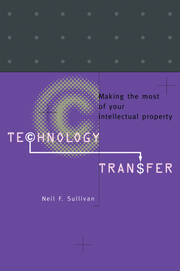Book contents
- Frontmatter
- Contents
- Prologue
- Acknowledgements
- 1 Bringing your technology to market
- 2 So do you really have something of value?
- 3 The first steps towards commercialisation of your technology
- 4 The difficult problem of valuation of intellectual property
- 5 Developing your ideas
- 6 The licensing option
- 7 Forming your own company
- 8 Financing the business start up
- 9 Make your technology a commercial success
- 10 Conclusion
- Appendices
- Index
5 - Developing your ideas
Published online by Cambridge University Press: 02 November 2009
- Frontmatter
- Contents
- Prologue
- Acknowledgements
- 1 Bringing your technology to market
- 2 So do you really have something of value?
- 3 The first steps towards commercialisation of your technology
- 4 The difficult problem of valuation of intellectual property
- 5 Developing your ideas
- 6 The licensing option
- 7 Forming your own company
- 8 Financing the business start up
- 9 Make your technology a commercial success
- 10 Conclusion
- Appendices
- Index
Summary
One of the greatest pains to human nature is the pain of a new idea.
Walter Bagehot The ‘Age of Discussion’ in Physics and Politics, 1872Introduction
This chapter will consider the issues of developing your technology further. This will involve marketing yourself and your product to potential licensees, financiers and/or technology transfer companies should you choose to use one. It will involve looking at how to find potential licensees, how to segment the market and what information is publicly available to you. The next section will look at the options for commercialisation and how to choose between them.
Consultancy and contract research
The ‘top end’ of the technology transfer business and therefore also that of taking your research to market are the business start up and licensing deals. There are however, two other areas whereby commercial links can provide revenue and more importantly, can begin to form effective relationships. These lie in the areas of: (a) contract research, whereby industry sponsors a definite piece of work for a given period of time, using given resources and with an expectation of a defined end result; and (b) the general marketing of consultancy services. The latter involves the wide range of academic expertise in the university that can be sold to the benefit of all sectors of industry. In marketing yourself and your technology, you should not be quick to discount these avenues.
- Type
- Chapter
- Information
- Technology TransferMaking the Most of Your Intellectual Property, pp. 71 - 90Publisher: Cambridge University PressPrint publication year: 1995



